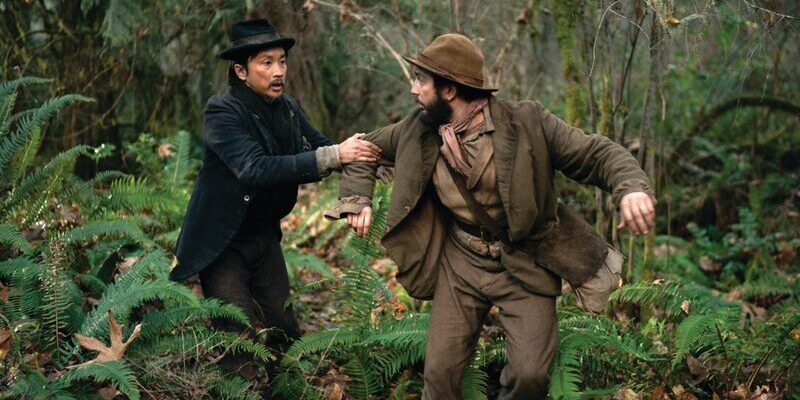
In 1820 Oregon, two friends come up with a scheme to make biscuits from
milk stolen from the region's only cow.
Review by
Eric Hillis
Directed by: Kelly Reichardt
Starring: John Magaro, Orion Lee, Toby Jones, Ewen Bremner, Scott Shepherd, Gary
Farmer, Lily Gladstone

You know how hipster startups sometimes like to invent backstories
regarding the origins of the company they literally conceived of six
months ago? Well imagine if you will a film based on the dubious origins
of a Portland, Oregon cupcake franchise. That's a lot like how
Kelly Reichardt's story of frontier entrepreneurship,
First Cow, plays out.

In 1820 Oregon, Otis "Cookie" Figowitz (John Magaro) is the
put-upon cook for a bunch of fur-traders. One day while foraging in the
woods for anything he might be able to turn into a meal, he stumbles
across the shivering form of a naked Chinese man. The stranger
introduces himself as King-Lu (Orion Lee) and explains how he had
to make a hasty getaway after shooting a Russian trapper in an act of
self-defence. Cookie gives King-Lu some food, clothes and shelter for
the night before the two go their separate ways.
Later, Cookie and King-Lu bump into one another in a newly prosperous
frontier town. The two men bond over a bottle of hooch and King-Lu
invites Cookie to stay at his shack. When English toff "Chief Factor"
(Toby Jones) arrives in town with the first cow to be introduced
to the region, Cookie and King-Lu see a business opportunity. At night
they sneak onto the Chief Factor's estate and fill a bucket with milk
from the animal. Using this milk, Cookie whips up some tasty biscuits
(which I believe are what Americans call scones, though I could be
wrong), slathers them in honey and sells them to the hungry traders that
frequent the area. Business begins booming, with even the Chief Factor
becoming a regular customer ("It tastes like London!" he beams upon
biting into the cake"), but how long can they pull off this scam before
being rumbled?

As a commentary on the roots of American capitalism,
First Cow is a rather blunt allegory. Cookie and King-Lu
embody the spirit of enterprise that Americans pride themselves on, but
of course, like most successful business enterprises, they're making
money at someone else's expense. There's a delicious irony to the Chief
Factor hiring the men to bake a confection for an upcoming meeting of
local bigwigs, completely oblivious to the idea that he's paying them
for stealing his own produce. Had Cookie and King-Lu approached him with
their idea initially, he no doubt would have refused them and possibly
stolen the notion of making biscuits from his cow's milk for himself.
It's a sad truth that those who come up with winning ideas are so often
dismissed by those who could help them realise their ambitions that they
have to turn to underhand methods to achieve their goals.
First Cow boasts the sort of setup that would have made
for a cracking Preston Sturges comedy, or even a Laurel and Hardy short.
While her films often mine a vein of oily black humour, Reichardt
doesn't exactly make giggle a minute comedies, and while the central
concept forces a grin, laughs are all too scarce in
First Cow's two hour plus running time. The film moves at exactly the pace you
would expect from a Reichardt movie set in the 19th century, with over
half the movie expired before the premise begins to take shape. You
might argue this time is taken to establish the friendship between
Cookie and King-Lu, but if this were a western from Anthony Mann, John
Ford or Howard Hawks and Magaro and Lee were replaced by Jimmy Stewart
and Walter Brennan, we'd have picked up on their close bond within
minutes.

Magaro and Lee are likeable in their roles, but Reichardt confines them
within a suffocatingly rigid formality. Cookie and King-Lu are a lowbrow
comic partnership stuck in a highbrow arthouse movie, as uncomfortable
in this setting as ranch hands invited to afternoon tea. I found myself
desperate for the pair to break out in a dance number or engage in some
good old slapstick, and I can't help but wonder what the Coen brothers
might have done with this premise.


